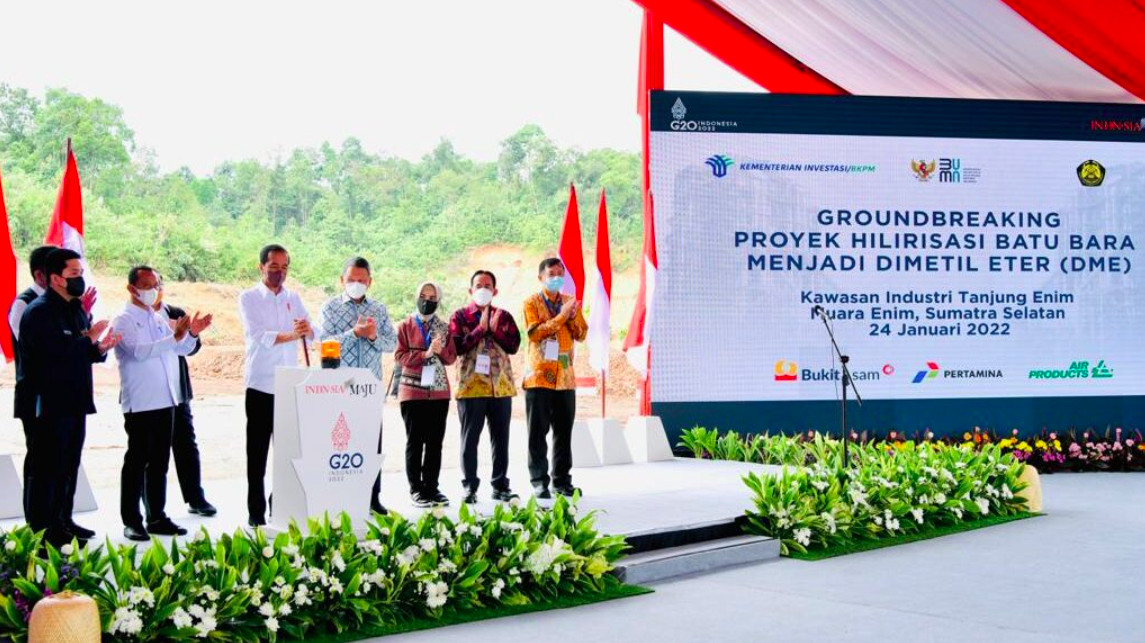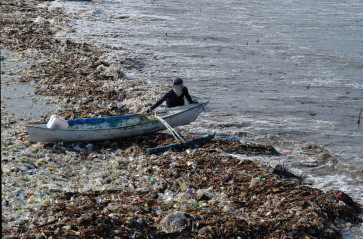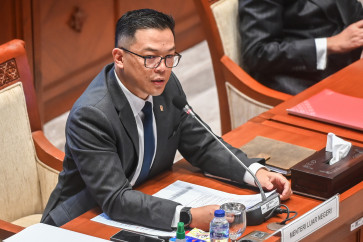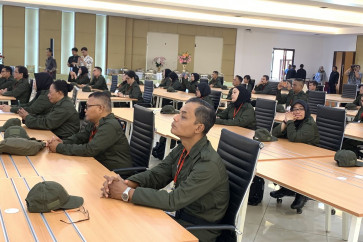Popular Reads
Top Results
Can't find what you're looking for?
View all search resultsPopular Reads
Top Results
Can't find what you're looking for?
View all search resultsIndonesia's climate actions should follow science, not politics
The government has been creating mixed signals by aiming to promote clean and renewable energy but, at the same time, seeking to continue the use of coal energy as long as possible.
Change text size
Gift Premium Articles
to Anyone
T
he climate crisis has become a scourge and will lead to a climate catastrophe as temperatures increase. People's fear of the climate crisis has been emphasized by a newly launched report by the World Economic Forum, titled Global Risks Perception Survey 2023, as "natural disaster and extreme weather events" and "failure to mitigate the climate crisis" are ranked among the top-five severe global risks over the next two years.
Moreover, climate-mitigation failure is ranked as the most severe risk over the next decade, followed by “failure of climate change adaptation”, “natural disasters and extreme weather events” and “biodiversity loss and ecosystem collapse”. In short, four out of the top-five global risks in the next decade are linked to climate and environmental issues.
These survey findings align with the newest Intergovernmental Panel on Climate Change (IPCC) AR6 Synthesis Report, which again determines that countries' climate actions are too slow as the Earth's temperature has risen by 1.1 degrees Celsius. It is heading toward an average global temperature increase of 2.8 degrees by 2100 based on Nationally Determined Contributions (NDCs), which will bring about global catastrophe, not only to the climate itself, but also to human beings and their welfare.
This figure is almost twice the target of 1.5 degrees stated in the Paris Agreement, which is the “safe” limit for global warming on the Earth. Governments' political commitments to addressing the climate crisis so far have been weak, as if the repeated warnings from the IPCC reports do not affect them.
Indonesia, which ranks fifth on the list of seven countries with the largest emissions in 2020 by the United Nations Environment Program (UNEP), announced its enhanced NDC with an increasing greenhouse gas (GHG) emission reduction target just before the 27th United Natgions climate conference (COP27). However, Indonesia's climate commitment is still considered insufficient and will lead to a temperature increase of up to four degrees, which is far from the target of the Paris Agreement.
As the only Southeast Asia country that made the list of the most significant GHG emitters, Indonesia is also among the countries that are highly vulnerable to climate risks, especially flooding and extreme heat.
According to the National Disaster Mitigation Agency (BNPB), Indonesia experienced 3,544 disasters in 2022, of which more than 90 percent were hydro-meteorological ones, with the majority being caused by rain and extreme weather. The frequency of hydro-meteorological disasters in Indonesia has increased over the past 40 years and has resulted in more than Rp 100 trillion (US$6.6 billion) in economic losses per year due to extreme weather, as calculated by Bank Indonesia. It is also projected that the potential economic losses due to the climate crisis will amount to 40 percent of Indonesia's gross domestic product in 2050.
On the one hand, the Indonesian government has made some progress in its efforts to reduce GHG emissions and to get in line with the Paris Agreement, specifically in the energy sector, as it is projected to be the biggest GHG emission contributor in 2030. The pinnacle moment was when Indonesia held the presidency of the Group of 20 last year and included the sustainable energy transition as one of the three main pillars discussed in that high-level conference. Several energy-related policies had also been introduced before, during and after the G20 to accelerate the energy transition, as called for by the IPCC.
On the other hand, there are some contradictions between those policies that show a half-hearted commitment from the government to achieve the Paris Agreement target, especially for the energy transition. It has been sending mixed signals that the government aims to promote clean and renewable energy but, at the same time, wants to continue the use of coal energy as long as possible.
The failure to translate the commitment into actions is mainly due to political interests. The current administration still aims to accommodate the interests of the coal business. As a result, Indonesia’s climate action overlooks science that asserts the need to accelerate the energy transition in a concrete way by phasing out coal.
One of the energy policies that was widely discussed before the G20 and until now is the new and renewable energy bill. Instead of being designed to accelerate the real energy transition, the government is using the bill to accommodate the interests of the coal elite by including coal-derivative products and labeling them as "new energy", namely coal gasification, coal bed methane and coal liquefaction.
The renewable energy bill is also supported by the newly ratified government regulation in lieu of Law on job creation, which provides incentives for coal-derivative products to be charged zero royalties. The use of coal-derivative products also contradicts the solutions recommended by the IPCC's AR6 Synthesis Report to use solar and wind energy, which have become competitive, even cheaper, than the electricity prices of fossil fuels. According to IPCC data, from 2010 to 2019, solar energy and wind energy prices dropped by 85 percent and 55 percent, respectively.
Another policy that shows the government's bias toward coal is Presidential Regulation No. 112/2022 on the acceleration of development of renewable energy for the provision of electricity. Although this regulation is titled in such a way, it grants permission for state electricity monopoly PLN and the industry to continue building new coal-fired power plants. Through this regulation, the government allows the construction of 13.8 gigawatts of coal-fired power plants, which is stated in the electricity business plan 2021-2030, and additional coal-fired power plant capacity for industrial use or captive coal power. It is estimated that as much as 15 GW of coal-fired power plants will be built to support various mineral and metal industrial processes in various regions in Indonesia.
The regulation runs counter to the spirit of and undermines the effectiveness of the Just Energy Transition Partnership (JET-P) launched at the G20 Summit last year when the International Partners Group (IPG) countries agreed to provide US$20 billion in financing to help Indonesia implement its decarbonization efforts. This financial assistance is needed by Indonesia, as the efforts need $285 billion in funding to achieve the target of reducing carbon emissions in 2018-2030. This high cost is strongly connected to the previous mistake of massively expanding coal power plant capacity by 44 percent in the period of 2017-2020.
All in all, as the IPCC has already warned that the clock is ticking and we must scale up climate actions quickly and ambitiously, Indonesia must also refer to this scientific analysis in formulating its policies. The government has to stop prioritizing the interests of the coal elite and continuing to provide loopholes to prolong the coal regime.
Indeed, Indonesia’s next president must determine the steps toward the climate tipping point in 2030 in a simple way: Follow science instead of politics.
***
Adila Isfandiari is Greenpeace Indonesia's climate and energy campaigner. Tata Mustasya is Greenpeace International's senior portfolio manager.










